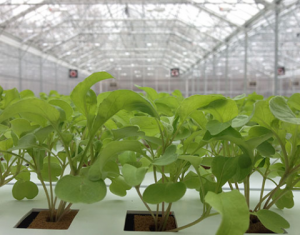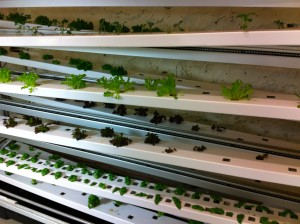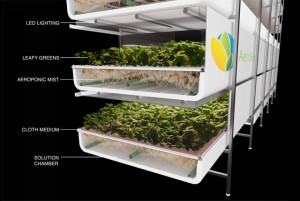Urban farming is a burgeoning sector of rooftop food production and sustainable agriculture that mostly utilizes hydroponics to achieve more efficiencies than historical soil-based methods.
The cleantech needs for sustainable agriculture comprise a broad array of products—from drones (yes, drones) to specialized LED lighting for plants. There is certainly room for innovation and proprietary technology, and some companies are already showcasing it.
Cleantech needs in the space includes remote monitors that enable teams to observe rooftop crops from facilities miles away; adoption of cloud-based data management and reporting systems; and software that locates, prevents and controls diseases—which can be particularly troublesome due to the high-moisture levels associated with hydroponics.
One company focusing on hydroponic systems specifically has developed a proprietary stackable rotating trough design that includes sensors and is designed to ensure that each individual trough gets its optimal amount of LED lighting and water.
Looking at the larger picture—much larger—one company is even researching and testing efforts to deploy agricultural-optimized drones.
3D Robotics is conducting tests with farmers to understand their needs and is testing custom drones for agriculture.
“Our approach is to make a product that fits into a farmer’s actual equipment,” Brandon Basso, lead researcher at 3D Robotics, told Forbes. “We want them to use drones the same way that they use their other farming equipment.”
3D Robotics is working from estimates to help it break down typical cost structures for farming to incentivize farmers to use drones.
One example of how drones could be of use to traditional farmers is by facilitating targeted, uniform spraying of pesticides over crops to protect them from fungal infections. Drones also are fitted with payloads such as cameras that would enable farmers to get a bird’s eye-view of their crops.
And Agriculture sector startups are also getting more attention from investors, experiencing a 61% increase in venture capital funding in 2013, versus the year prior, to $533 million, according to the Cleantech Group. (see below for our full list of Agriculture and Food Tech fundings.)
Rooftop Farms Reap Investor Funding
In the face of this growth in technology, the sector is also gaining momentum in terms of reaping the harvest of investors’ dollars.
New York City-based BrightFarms, Inc., which funds the construction of greenhouses atop or in proximity to partnering supermarkets to eliminate inefficiencies in the produce supply chain, raised $4.9 million in Series B financing in January, which lifts the company’s aggregate funding to $9.2 million.
NGEN Partners, Emil Capital Partners and BrightFarms founder Ted Caplow lead the round, which also included the participation of investors such as Paragon Foods president Elaine Bellin; New Ground Ventures founding principal Zac Zeitlin; and Coskata founder Todd Kimmel, a former partner at Mayfield Fund and now founding principal at Montage Ventures.

BrightFarms Plants
Specifically, BrightFarms builds and operates hydroponic greenhouses on or near the rooftops of grocery stores in order to reduce time, distance and cost from the produce supply chain. They sign a long-term fixed price contract guaranteeing volumes of revenue with large regional and national supermarket chains. This Produce Purchase Agreement (PPA) is then used to attract project financing to construct greenhouse farms on behalf of clients. They are believed to be the first company to attract institutional project finance capital for commercial urban agriculture.
“We are trying to change the produce supply chain in this country (United States),” Brightfarms CEO Paul Lightfoot told Forbes. “In five years, we will have greenhouses covering the Midwest and East Coast corridors, displacing a number of long-distance produce items that used to be sourced from the West Coast.”
With its new capital, BrightFarms plans to fund construction of new greenhouses as well as build out its team. It launched its first greenhouse in Bucks County, Pennsylvania in January 2013. At present, eight more are in development, in Washington, D.C., St. Louis, Mo., New York City, Chicago, Indianapolis, Kansas City, Oklahoma City, and St. Paul, Minn. Retail partners include A&P, Cub and Pathmark.
BrightFarms’ Series B arrives following the news last September that Montreal, Quebec-based Lufa Farms had unveiled its second greenhouse, atop a new office building in the Montreal metropolitan area.
Controlling Pests, Optimizing Sunlight
Lufa Farms started out in 2011 with a rooftop hydroponic greenhouse, also in Montreal. In 2012 the company completed a $4.5 million financing round led by Cycle Capital Management, with participation from Andrew Ferrier and the Kubo Greenhouse Project of the Netherlands, as CleantechIQ reported.
Both Lufa Farms greenhouses are 43,000 square feet—though the company says its greenhouse system is scalable and can be replicated on any rooftop in any city—but the new one, located in Laval, nearly doubles the yield of the first greenhouse, the company said. It can provide enough fresh produce to supply 6,000 people year-round.
Lufa’s new structure uses a special venting system to control pests and temperature and to optimize vital sunlight. The greenhouse also has a recirculating irrigation system for water and surface condensation.
Lufa Farms uses its own technology to remotely monitor the crops in Laval, about four miles away. The team remotely monitors and manages the cultivation at both its existing greenhouse and the new greenhouse site using a cloud-based data management and reporting system. Though the use of a proprietary software application, the team can quickly and accurately find, monitor, prevent, and control diseases and other problems, the company said.
“There’s a very large global opportunity that has opened up in comprehensive food production and distribution models for cities,” Dave Furneaux, a Boston-based investor and chairman of the board for the company, told MarketWatch. “This team has proven that their breakthrough business model works in Montreal and that they have the technology and vision to continue to scale both locally and globally.”
Lufa Farms is said to be in talks about rolling out a third rooftop greenhouse in Boston.
Constructing “farms” atop buildings in cities saves on transportation and storage costs, for example, which raises profit levels—as well as environmental benefits. Urban greenhouses allow growers to reduce consumption of energy, water, and soil. In some instances, companies are also able to power these rooftop farms by harnessing the excess heat, waste and C02 created by cities.
Use of Hydroponic Systems Widespread
Then there is the common denominator among many of these companies, the hydroponic systems. Hydroponics, simply put, is a method of growing plants using mineral nutrient solutions in water; there is no inclusion of soil in the process. This is considered a more environmentally friendly way of farming as it requires the use of fewer natural resources compared to traditional soil-based farming according to City Hydroponics. The company offered the following details regarding hydroponics-based urban farming versus soil-based farming: The former can provide a 30% faster growth rate than the latter; requires less space, as a 5,000-square-foot facility is capable of producing as much produce as one acre of farmland, and it can provide a much larger yield, up to 10 times the size of soil-based systems.
City Hydroponics produces hydroponic systems that are more efficient than traditional hydroponic systems for growing leafy greens, such as kale and swiss chard. Its flagship product, called the Vertically Oriented Hydroponic System (VOHS), has the ability to produce a yield nine times larger than traditional hydroponic systems, according to the company. The company is currently looking to raise its first round of funding from strategic partners and venture capital firms.

A key differentiator of City Hydroponics’ VOHS system is its stackable rotating trough design, which ensures each trough gets an equal amount of both LED lighting and water. The VOHS system also uses electric sensors to determine if additional lighting is needed.
CEO Sandra Rodriguez, who is also an investor, started the company as a social venture in Newark, New Jersey, where the company is based, to create local farms and local jobs in the area.
Aside from selling its hydroponic system the company also designs and builds greenhouses and agricultural technology for controlled environments. Clients range from educational institutions to large-scale commercial businesses. City Hydroponics also will take charge of operating the facilities that it manufactures and sells, as well as training workers.
Going forward, the company will continue to focus on R&D to produce technology solutions and services; it also is seeking to develop standardized technology prototypes—all part of a larger effort to produce a hydroponic system specifically optimized for urban farming.
Other Companies Playing in the Space
Other companies include Brooklyn Grange, an urban rooftop farm that cultivates a one acre rooftop in Queens, New York and two-and-a-half acre rooftop in the Brooklyn Navy Yard. These farms supply vegetables to restaurants, farmer’s markets and have 40 CSA members. They use organic farming methods, using soil developed for green roofs that is lightweight with porous stones that slowly break down to add nutrients to the soil. The farm was financed through a combination of private equity, loans, grassroots fundraising events and crowdfunding platforms like Kickstarter.com. They broke even their first year and showed 40% growth their second year.
Plantagon broke ground in Stockholm, Sweden in 2012. The spherical design of the greenhouse maximizes available light. These are predicted to be produce three times more crops than traditional methods. They believe that profitability lies in the fact there will be no middlemen, storage or transportation costs.
AeroFarms, based in New York state, devised technology to plant leafy greens in a cloth bed and irrigate with a nutrient-infused mist, a process they dub “aeroponics.” LED lamps provide light and can be set to emit wavelengths that work as pest control. Using modules, produce can be can be grown year round in old or vacant urban buildings.

Recent Agriculture and Food Tech Fundings
March 5– Mekitec raised $3M from Inventure Capital and Finnish Industry Investment. The company, based in Finland, manufactures and distributes X-ray food quality control systems for the food industry.
March 4 – Aseptia, received $28M in Series C funding from Lookout Capital, SJF Ventures, Prudential, and the F.B. Heron Foundation. N.C.-based Aseptia’s patented aseptic technology enables the production of shelf-stable food products that maintain the flavors and nutrients of fresh food without the use of preservatives or refrigeration.
March 3 – JDC Phosphate raised $8M. The company, based in Florida, produces high-purity phosphoric acid using low-grade phosphate rock for use in agriculture.
Feb 20 – Granular raised $4.2M from Andreessen Horowitz, Google Ventures, and Khosla Ventures. The company, based in San Francisco, develops cloud software and analytics platform helps farmers become more efficient and make better business decisions.
Feb 19 – Myco Technology raised a Series B funding (undisclosed) and $1.05M in Debt from undisclosed investors. The company, based in Colorado, created a new process using gourmet fungi that transforms agricultural products to improve their taste and value.
Feb 7 – Hampton Creek Foods raised $23M in Series B funding from Horizons Ventures, with participation from Jerry Yang and AME Cloud Ventures, Ali and Hadi Partovi, Jessica Powell of Google, Scott Banister, and Ash Patel. The company, based in Silicon Valley, focuses on finding new ways of utilizing plants to replace eggs in a variety of different products.
Feb 4 – Foodpanda raised $20M from Phenomenon Ventures. The company, based in Germany, is a leading online marketplace for food delivery.
Jan 29 – Brightfarms raise $4.9M in Series B funding from NGEN Partners, Emil Capital Partners, and Brighfarms founder Ted Caplow. The New York-based hydroponic grower contracts directly with supermarkets in building urban greenhouses that can supply fresh, local produce year round.
Jan 28 – Food Genius raised $1M in Series B funding fom Hyde Park Venture Partners, Pritzker Group Venture, Chicago Ventures. The Chicago-based big data startup provides industry insights and analysis to the food industry.
Jan 22 – Drizly raised $2.25M in seed funding from Atlas Ventures, Abundance Partners, Breakaway Ventures, Continental Advisors, Fairhaven Capital and Reynolds & Company Venture Partners. The Boston-based on-demand alcohol delivery startup allows users to order beer, wine and liquor through the Drizly ap.
Jan 14 – FarmLogs raised $4M from Drive Capital, Huron River Ventures, Hyde Park Venture Partners and Hyde Park Angels. The Ann Arbor MI-based farm management software and mobile app developer helps farmers digitally manage their farms in order to increase yield and profitability.
Jan 6 – Plated raised $5m in Series A funding from ff Venture Capital, Lerer Ventures, Founder Collective and Great Oaks Venture Capital and other angel investors. The New York-based company develops a subscription service for ready-to-cook meal ingredients and recipes.
Kazuha Kurosu, a graduate student in the The New School’s Environmental Policy and Sustainability program in New York City, contributed to this article.